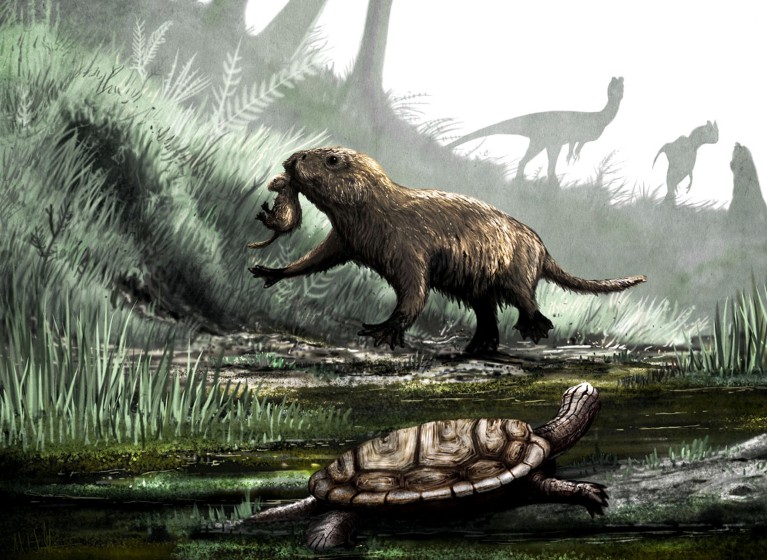- OUTLOOK
The eyes of mammals reveal a dark past

Kayentatherium (centre), an early mammal-like animal, lived in the shadow of dinosaurs such as Dilophosaurus during the early Jurassic, a period that occurred 201 million–174 million years ago. Credit: Mark Witton
Access options
Access Nature and 54 other Nature Portfolio journals
Get Nature+, our best-value online-access subscription
$29.99 / 30 days
cancel any time
Subscribe to this journal
Receive 51 print issues and online access
$199.00 per year
only $3.90 per issue
Rent or buy this article
Prices vary by article type
from$1.95
to$39.95
Prices may be subject to local taxes which are calculated during checkout
doi: https://doi.org/10.1038/d41586-019-01109-6
This article is part of Nature Outlook: The eye, an editorially independent supplement.
References
Hall, M. I., Kamilar, J. M. & Kirk, E. C. Proc. Biol. Sci. 279, 4962–4968 (2012).
MacIver, M. A., Schmitz, L., Mugan, U., Murphey, T. D. & Mobley, C. D. Proc. Natl Acad. Sci. USA 114, E2375–E2384 (2017).
Maor, E., Dayan, T., Ferguson-Gow, H. & Jones, K. E. Nature Ecol. Evol. 1, 1889–1895 (2017).
Davies, W. I., Collin, S. P. & Hunt, D. M. Mol. Ecol. 21, 3121–3158 (2012).
Schmitz, L. & Motani, R. Science 332, 705–708 (2011).
Angielczyk, K. D. & Schmitz, L. Proc. Biol Sci. 281, 20141642 (2014).
Gaynor, K. M., Hojnowski, C. E., Carter, N. H. & Brashares, J. S. Science 360, 1232–1235 (2018).

 Four technologies that could transform the treatment of blindness
Four technologies that could transform the treatment of blindness
 Breaking the myopia myth
Breaking the myopia myth
 A smart solution to vision problems
A smart solution to vision problems
 How artificial intelligence is helping to prevent blindness
How artificial intelligence is helping to prevent blindness
 Machine diagnosis
Machine diagnosis
 Lighting design for better health and well being
Lighting design for better health and well being
 Eyes hint at hidden mental-health conditions
Eyes hint at hidden mental-health conditions







